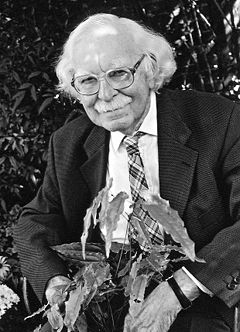
William T. Stearn
Encyclopedia

Order of the British Empire
The Most Excellent Order of the British Empire is an order of chivalry established on 4 June 1917 by George V of the United Kingdom. The Order comprises five classes in civil and military divisions...
(16 April 1911 – 8 May 2001) was a British
United Kingdom
The United Kingdom of Great Britain and Northern IrelandIn the United Kingdom and Dependencies, other languages have been officially recognised as legitimate autochthonous languages under the European Charter for Regional or Minority Languages...
botanist known for his expertise on the history of botany and in the classical languages. His work is widely read, with his etymological dictionary of Latin names of garden plants likely the best-known of the works appearing under his own name. Among botanists his Botanical Latin, now in its fourth edition (1995), is a standard reference.
Stearn was Librarian of the Royal Horticultural Society
Royal Horticultural Society
The Royal Horticultural Society was founded in 1804 in London, England as the Horticultural Society of London, and gained its present name in a Royal Charter granted in 1861 by Prince Albert...
from 1932–1951 (with a break for war service), having been "discovered" by the horticulturalist E. A. Bowles
Edward Augustus Bowles
Edward Augustus Bowles, VMH , known professionally as E. A. Bowles, was a British horticulturalist, plantsman and garden writer. He developed an important garden at Myddelton House, his lifelong home at Bulls Cross in Enfield, Middlesex and his name has been preserved in many varieties of...
while working in a bookshop in Cambridge
Cambridge
The city of Cambridge is a university town and the administrative centre of the county of Cambridgeshire, England. It lies in East Anglia about north of London. Cambridge is at the heart of the high-technology centre known as Silicon Fen – a play on Silicon Valley and the fens surrounding the...
.
He was President of the Linnean Society (named after the 18th century Swedish botanist Carl Linnaeus) from 1979 to 1982 and in 1976 was awarded their Gold Medal (now the Linnean medal
Linnean Medal
The Linnean Medal of the Linnean Society of London was established in 1888, and is awarded annually to alternately a botanist or a zoologist or to one of each in the same year...
) and then in 1993 the Engler
Adolf Engler
Heinrich Gustav Adolf Engler was a German botanist. He is notable for his work on plant taxonomy and phytogeography, like Die Natürlichen Pflanzenfamilien , edited with Karl A. E...
medal in gold. He was also the recipient of the Asa Gray Award in 2000, the highest honor of the American Society of Plant Taxonomists
American Society of Plant Taxonomists
The American Society of Plant Taxonomists is a botanical organization formed in 1935 to "foster, encourage, and promote education and research in the field of plant taxonomy, to include those areas and fields of study that contribute to and bear upon taxonomy and herbaria", according to its bylaws...
. He has sometimes been referred to as "the modern Linnaeus".

